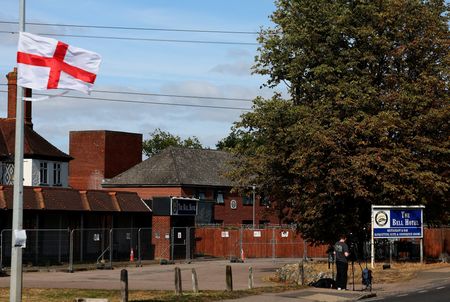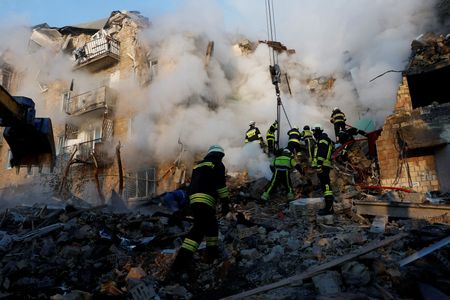By Michael Holden and Sam Tobin
LONDON (Reuters) -The British government argued a court ruling requiring asylum seekers to be temporarily evicted from a hotel risks sparking further chaotic protests outside the residences housing them, as it appealed against the decision on Thursday.
Last week, the High Court in London granted a temporary injunction to stop asylum seekers from being housed in the Bell Hotel in Epping, about 20 miles (32 km) northeast of London in the county of Essex.
The building had become a focal point of sometimes violent demonstrations by anti- and pro-immigration groups after an Ethiopian asylum seeker was charged with sexual assault offences, and opposition lawmakers have called for more protests and legal action to have all such hotels closed down.
According to a regular tracker of voters’ concerns, immigration is now the biggest issue amid anger over record numbers of asylum seekers arriving in small boats across the Channel, including more than 28,000 this year.
On Thursday, the hotel owners and the British government sought permission to appeal against the injunction which had been granted to the local authority on planning grounds.
Lawyers for the government argued that the High Court judge had failed to take into account the significant national impact the ruling would have, and suggested that Epping Council, run by the opposition Conservatives, was seeking to exploit nationwide tensions over immigration for political purposes.
“Epping’s planning concerns appear to be disproportionately targeted towards asylum accommodation, which suggests that its motivation is not solely, or even principally, the integrity of its planning regime,” the lawyers said in a written submission to the Court of Appeal.
“The granting of an interim injunction in the present case runs the risk of acting as an impetus for further protests, some of which may be disorderly, around other asylum accommodation.”
They also argued that any closure of hotels would put pressure on the system to house the thousands of asylum seekers waiting to have their cases determined. Britain currently houses about 30,000 migrants in more than 200 hotels across the country.
Earlier this week, Nigel Farage, leader of Britain’s anti-migration Reform UK party which is leading in opinion polls, announced a plan to repeal human rights laws to allow for mass deportations of asylum seekers which he said was needed to prevent “major civil disorder”.
Pro-migrant groups say far-right groups and opportunistic politicians are deliberately seeking to exploit and inflame tensions for their own ends.
Critics say that housing asylum seekers in hotels, often young men who are not allowed to work, puts the local community at risk, and point to recent incidents where some migrants have been accused of serious crimes including the rape and sexual assault of young girls.
This week, an Ethiopian asylum seeker went on trial accused of sexually assaulting a teenage girl and another woman in Epping, accusations he denied.
(Reporting by Michael Holden; Editing by Alex Richardson)










